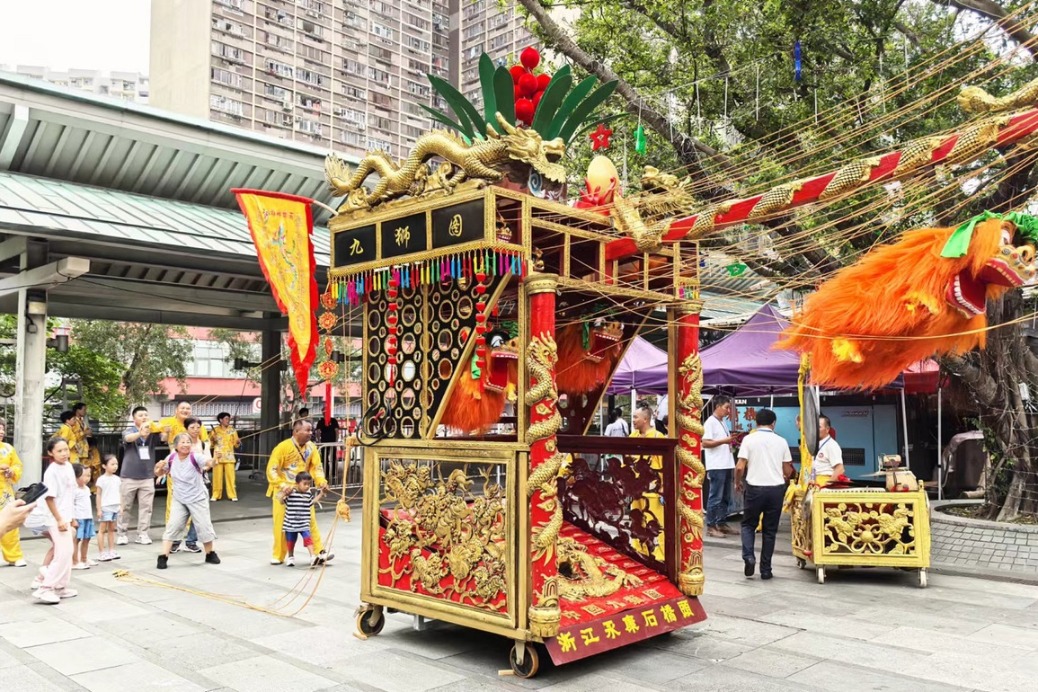Young people change their perception toward consumerism


Frugal, low-cost lifestyles attract growing number of followers
More young people in China are looking to frugal, low-cost lifestyles in order to spend less and save more.
In following a trend adopted by their counterparts in many other countries, they are beginning to realize and reject the pitfalls of consumerism, believing that simplicity can bring happiness and satisfaction, experts said.
Economic and employment pressures, as well as changing perceptions toward material life, are also resulting in more young people turning their backs on extravagance and waste in the post-pandemic era, the experts added.
Frugality is being practiced in a number of ways. Some young people opt for discounts and low-priced goods, while others are replacing well-known brands with those that are cost-effective. Some are cautious when buying nonessential items, while others say they save all they can in order to make important purchases.
He Jiazheng, 22, a college student in Shenzhen, Guangdong province, said he spends about 10 yuan ($1.38) on each meal and no more than 100 yuan on each item of clothing.
"In middle school, I only used to buy major brands. Then, I realized that a piece of clothing, regardless of whether it is from a well-known brand or not, may only be worn for one or two years. So, eventually I felt it was unnecessary to buy brand names. As long as the clothes are suitable to wear, this is fine," He said.
"Besides, the quality of famed brands sometimes is not as good as that of ordinary ones."
He, who is studying economics, said his pursuit of frugality stems from the idea of "realizing maximum happiness through minimum expenditure".
The student added, "As luxury food and brand-name clothing cannot increase my happiness, why not satisfy myself by spending less for the same amount of happiness?"
Discounts eyed
Luna Lu, 23, a post-graduate student in Beijing, said her frugal behavior was influenced by her financial situation. "I would like to have better things, but in order to save money for more worthwhile activities, I need to make an effort to be thrifty," she said.
For example, she usually goes shopping during holidays when discounts are often offered and she can buy items that will last her some time. She also purchases cheaper video memberships on websites, and keeps an eye on discounted furniture.
"I am happy with these money-saving methods. I use the money I save to meet my social and cultural needs, such as dining out with friends or attending concerts," Lu said.
She said she tries to avoid so-called pink taxes — a levy or other cost added to the price of a product or service aimed particularly at or used by women, especially when compared to similar products for men.
"For instance, I use men's razors instead of women's hair removal razors and buy men's shorts or sweatshirts. Once something carries a feminine touch, it becomes more expensive without necessarily being of better quality. On the other hand, men's clothing is generally cheaper than women's, and at times even has better fabric," she said.
Lu added that consumerism has become a mainstream and dominant form of society because it aligns with human nature.
"Everyone wants to show their worth through the things they buy. It's the easiest way to find happiness. I don't completely reject this kind of happiness, so I don't entirely reject the consumer society either. Even if I know it can be a trap, I still might fall into it," she said.
Eating cheaply
Zhang Ying, 19, from Foshan, Guangdong, excels at budget planning.
In June and last month, she only spent 800 yuan each month, eating stewed noodles cooked in her dormitory, bread and milk bought on the online discount platform Pinduoduo, and half-priced yogurt fruit mix bought on campus after 9:30 pm.
Her short-term goal is to save money to attend a concert performed by Mayday, her favorite singing group, while her longer-term goal is to travel to Lhasa, Tibet autonomous region, Hong Kong and Macao during the next semester.
Zhang said she enjoys saving small amounts "to do big things" and is not fussy about what she eats or wears.
"Living a frugal life allows me to have fun without asking my parents for extra money. I am very happy about this," she said, adding that eating simple meals also helps her lose weight.
"I still have three meals a day, but they are low in oil and salt. I initially felt nauseous at the thought of eating noodles, but thankfully I persevered and conquered my fears."
Zhang, who receives pocket money of 2,000 yuan a month from her parents, said, "I often trick myself into thinking that I only have 50 yuan left for the week, so that I will be reluctant to spend money recklessly."
When she has some extra cash, she stocks up on items such as tissues, sanitary pads, charging cables, shampoo and shower gel. "I also top up my phone credit as soon as I receive my pocket money, so that when I need to be frugal, I can still get by," she said.
Tang Weibo, 25, from Shenzhen, who tends to shop online instead of using offline outlets, avoids shopping at night, as he does not want to make impulsive purchases. He also uses a variety of shopping coupons.
But he disagrees with adopting frugality at the expense of time or a reduced quality of life. "If I spend two hours to gain a discount of 3 yuan, this is not reasonable frugality," he said.
Wardrobe tackled
In Shanghai, the simple lifestyle of Coco Wu, 34, a human resources worker, mainly involves sorting, storing and finding numerous uses for items.
She started by organizing her wardrobe. "Clearing out the piles of clothing made me realize just how much unconscious buying and wastage I had been engaged in. This served as a reminder to avoid frequent purchases," she said.
"It's been more than 10 months since I last bought clothes, and yet I don't feel as if I have nothing to wear. I have saved a lot of money and avoided waste in terms of buying clothes."
She uses a bar of soap not only for washing clothes but also as a natural air freshener for rooms, and to remove odors from shoe cabinets. Wu said that in pursuing frugality, many people also use soap to wash their hair, but she will not do this, as soap can damage the hair.
She said the concept of decluttering she read about in books made her realize the relationship between people and their possessions, and that instead of constantly organizing and buying items, it is better to think about simplifying belongings.
She added that she has almost halved her expenses by adopting a simple approach to daily life.
"I feel that decluttering brings less chaos to life. For example, in the morning, I don't waste time thinking about dressing to please others, and I don't feel insecure about my appearance due to a bad combination of outfits. On the other hand, the money saved by living simply can be put by for future needs, giving me peace of mind," Wu said.
Travel expectations
Ma Yuan, 36, a teacher in Shanxi province, began saving money a year ago to keep account of her spending, as her family expects to travel frequently.
She stopped buying well-known brands of cosmetics — using cheaper products instead. Ma also recycled empty boxes, cut back on dining out, and reduced the number of unnecessary purchases.
"While pursuing material desires may bring temporary happiness, I have discovered that living a more frugal lifestyle can lead to a sense of spiritual abundance (the belief that there is enough for everyone)," she said. "I have many dreams that require financial support, but by consciously controlling and reducing my spending, I am able to bring those dreams closer to reality.
"I have not felt that my quality of life has declined, but rather that it has improved. By saving money on a day-today basis, I am able to confidently purchase better-quality items that I truly love and desire," she said.
Yu Xin, 34, a saleswoman in Jilin province, buys discounted vegetables after 7 pm and cheap clothes at a wholesale market, as the cost of raising her child is high. She also thinks that she may lose her job when she is older. In addition, her husband is not earning a stable wage as a construction worker.
A number of young netizens have taken to social media platforms such as Douban and Xiaohongshu to share their experiences of saving money. Some label themselves "stingy", while others joke that they are going mad in their desire to save. They address topics such as "How to buy a meal for just 3 yuan" or "How to use shower gel for a year".
For thousands of years, Chinese have regarded frugality as a virtue and a good lifestyle choice. Confucius once praised student Yan Hui for remaining optimistic even though he ate from a bamboo basket, drank from a ladle, and lived in a humble alley, adding that he was a truly virtuous person.
United States author and philosopher Henry David Thoreau lived for two years by himself in a wooden house near Walden Pond, Massachusetts, close to nature and far from vanity. Walden, the book he wrote during this time, still sells well.
Positive move
Some people are forced to live a frugal life due to socioeconomic pressure, while others choose to do so as a rejection of excessive consumption, storage or waste in a fast-paced, impetuous society.
Li Daxiao, chief economist at Yingda Securities, said being thrifty is healthy, positive and a wise lifestyle decision. "For example, taking the subway can be faster than a taxi, while eating simply is also healthy," he said.
He said downward pressure on the economy has affected young people's spending power, prompting them to become more cautious.
"More people are learning to control and reduce their desire to spend, so that the money saved can be used for more important purposes, such as traveling and studying," he said.
Jason Yu, general manager at the Kantar Worldpanel China consultancy, said the COVID-19 pandemic over the past three years taught young people the importance of enhancing immunity, both physically and mentally, when confronted with uncertainties. It also encouraged them to abandon superficial pleasure to rethink the meaning of life.
This year, the performance of markets such as cosmetics and skin care, which are largely driven by young people, has declined significantly, showing that this group of consumers has become more cautious.
"They are very smart in finding cheaper products with a high efficacy, so that their quality of life is not compromised by lower costs. They are also more willing to make trade-offs in life," Yu said.
He suggested that companies adjust their strategies and develop products to match young people's new consumption habits and values.
Joanna Lu, global expert partner at the consultancy Bain& Co, said consumption is not being downgraded, but the industry needs to look at ways to stimulate consumer desire and provide customers with more value-based reasons to shop.
"Why have products such as a liter of iced Americano or various bulk-packaged goods had such a big impact on the market? It is not difficult to discover that they not only have high quality but also offer better cost-effectiveness," she said.
Discount stores where consumers can buy high-end products at extremely low prices also attract a large number of young people who are not wealthy but want to improve their quality of life, Lu added.
Cui Yutong contributed to this story.
- Pingtan center a key stop for Taiwan compatriots seeking mainland qualifications
- Over 5,000 artists to take part in Shanghai festival
- Innovation, collaboration creating a brighter future for healthcare
- Honoring role models, Xi makes rallying call for making China stronger
- Profile: A Chinese doctor's ground-breaking battle against leukemia
- China publishes chronicle of CPC events from 1921 to 1949





































